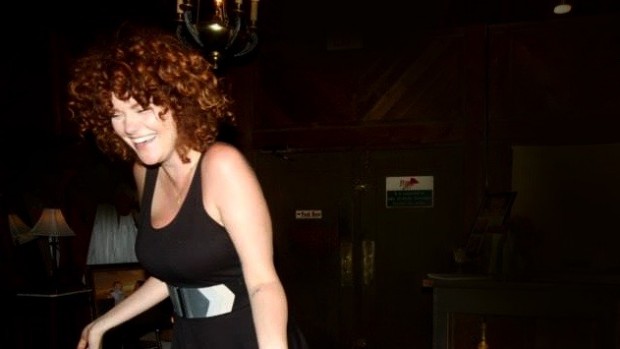 Back to selection
Back to selection
Applesauce Producer Melodie Sisk
 Melodie Sisk
Melodie Sisk Filmmaker‘s Taylor Hess recently attended and reported on the U.S. in Progress series at the Champs-Élysées Film Festival. While there, she spoke to a number of female directors and producers. Below, her conversation with Applesauce producer Melodie Sisk.
Filmmaker: What was your timeline on Applesauce?
Sisk: Applesauce moved so fast! We essentially had no real pre-production and had to jump right in. This made our schedule erratic, we’d shoot a few days at a time, jumping around between holidays, and then, just like that, we premiered at Tribeca exactly five months to the date of our first day of shooting. It was wild, which is how Onur [Tukel] likes it, with an amazing and committed group of people working on the film.
Filmmaker: In addition to producing, you also had a small role in the film.
Sisk: In this one (Applesauce) I’m essentially just an extra, but I do often play roles in the films I produce. That being said, I’m more comfortable playing supporting roles if I’m wearing the many hats that come with micro-budget producing. There has to be some balance. In the past I have tried juggling a principle role and the lead producer responsibilities… it was not healthy for me. In Applesauce, an extra didn’t show up for a scene, so I did it… but it’s often that way when I’m producing — a fair amount of ‘I’ll do it.’
Filmmaker: How was working as an actor after studying at North Carolina School of the Arts?
Sisk: Well, I thought I had quit acting at one point. After graduation, I felt really out of control because I was very much at the mercy of other people, and I didn’t like the scripts I was reading. But when my friend from college, Zach Clark, sent me his script Modern Love is Automatic, I felt a door open again. After some location set backs, I was terrified the movie wasn’t going to get made, and literally changed my entire life to help the film become realized. That was, unbeknownst to me at the time, when I began producing… And now, ten years later, Zach and I are about to start our fourth feature together, Little Sister, which we are putting together funding for now!
Filmmaker: Why did you feel out of control as an actor?
Sisk: More than anything, it was the lack of creative choices I felt I had access to in the beginning. I had an agent who had different ideas about my career than I did — it was like a bad controlling relationship. As a producer, I get to be a part of the creative team, which feels powerful… but I think those things can and should coexist.
Filmmaker: How do you stay calm when you are producing, particularly when there’s such a fast timeline, and while you’re also wearing so many hats?
Sisk: An acting teacher in college told me, “There are no problems, only solutions.” It didn’t totally hit me until years later, but that’s what it means to me to be a producer. Sure, I’ll point out issues, but I try to remember to always be solution oriented rather than problem oriented.
Filmmaker: After living and working in New York, why’d you move to Birmingham?
Sisk: I was introduced to Birmingham through film. First by the incredible reputation of the Sidewalk Film Festival, and secondly as a juror for their sister LGBTQ festival SHOUT. I found that the city had an interesting up and coming arts scene, some unbelievable food, and I made a lot of queer friends… including the person who eventually became my partner. I’m not someone who believes you can only make great art in New York and L.A. The years I spent in N.Y. were incredibly important to my career, socializing with and having access to the voices of our generation especially. But I also think that kind of socializing is available for filmmakers on the festival circuit. I’m inspired by creative rebirth and new landscapes. Birmingham is a city that has a dark past, but wants to move beyond it — and art is an important part of revitalization.
Filmmaker: How do you think LGBTQ stories in film are being represented today?
Sisk: Well, I’m interested in telling queer stories, but in the context of narratives that are about more than “being queer.” I’m currently producing a project called Command & Control, which deals with a person exploring gender spirituality, polyamory, and sexuality. I’m also currently running a Kickstarter for a web series I’m co-directing called Ms. Guidance that I sometimes refer to as “post-gay.” What I mean by this is that there is a fluidity to the sexualities of our characters that needn’t always be labeled. And then there is Pharmacopeia, which is more of a traditional narrative about AIDS and HIV, but the story doesn’t discriminate. The characters in our stories are becoming more diverse, but I hope to keep seeing queer characters in the context of narratives telling equally diverse stories. With Caitlyn Jenner bringing so much focus to trans issues lately I’ve seen many discussions become destructive. Being an ally is important, but it is also important not to push people away. There’s a way to have these discussions that is inclusive and caring — I think Orange is the New Black does a great job of this! Hopefully through film we can continue to shed further light by creating well rounded and complicated characters that allow audiences to experience pathos.
